江苏省阜宁中学2018-2019学年高一上学期期中考试英语试题
2018-2019学年高一英语上学期期中试卷(含解析) (I)
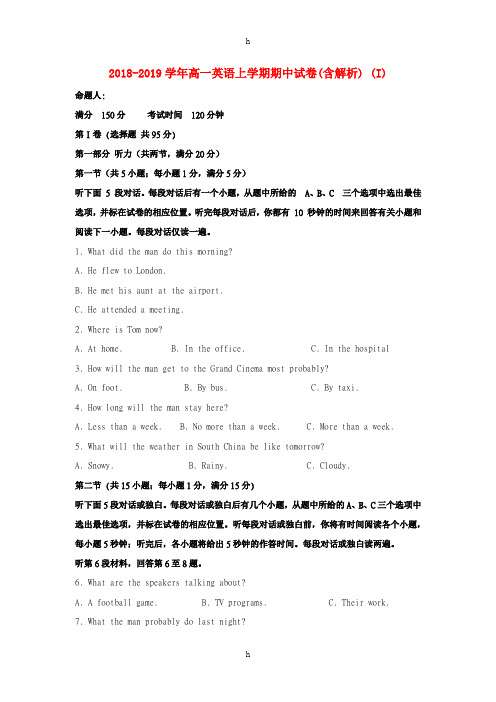
2018-2019学年高一英语上学期期中试卷(含解析) (I)命题人:满分 150分考试时间 120分钟第I卷 (选择题共95分)第一部分听力(共两节,满分20分)第一节(共5小题;每小题1分,满分5分)听下面 5 段对话。
每段对话后有一个小题,从题中所给的 A、B、C 三个选项中选出最佳选项,并标在试卷的相应位置。
听完每段对话后,你都有 10 秒钟的时间来回答有关小题和阅读下一小题。
每段对话仅读一遍。
1. What did the man do this morning?A. He flew to London.B. He met his aunt at the airport.C. He attended a meeting.2. Where is Tom now?A. At home.B. In the office.C. In the hospital3. How will the man get to the Grand Cinema most probably?A. On foot.B. By bus.C. By taxi.4. How long will the man stay here?A. Less than a week.B. No more than a week.C. More than a week.5. What will the weather in South China be like tomorrow?A. Snowy.B. Rainy.C. Cloudy.第二节 (共15小题;每小题1分,满分15分)听下面5段对话或独白。
每段对话或独白后有几个小题,从题中所给的A、B、C三个选项中选出最佳选项,并标在试卷的相应位置。
听每段对话或独白前,你将有时间阅读各个小题,每小题5秒钟;听完后,各小题将给出5秒钟的作答时间。
每段对话或独白读两遍。
听第6段材料,回答第6至8题。
江苏省阜宁中学高一英语上学期期中试题牛津译林版

高一上学期期中考试英语试题第I 卷(选择题)第一部分:听力(共两节,满分20分)第一节(共5小题,每小题1分,满分5分)听下面5段对话。
每段对话后有一个小题,从题中所给的A、B、C三个选项中选出最佳选项,并标在试卷的相应位置。
听完每段对话后,你都有10秒钟的时间来回答有关小题和阅读下一小题。
每段对话仅读一遍。
1. How will the man go to he meeting?A. By bus.B. By taxi.C. By subway.2. What does the woman think of her love in a foreign country now?A. Exciting.B. Interesting.C. Boring.3. What are the speakers mainly talking about?A. A theft.B. A television.C. A policeman.4. What does the woman want to do during this summer?A. Teach at school.B. Go back to her motherland.C. Visit a foreign country.5. How many blocks does the man have to walk to get to the hospital?A. Two.B. Three.C. Five.第二节(共15小题;每小题1分,满分15分)听下面5段对话或独白。
每段对话或独白后有几个小题,从题中所给的A、B、C三个选项中选出最佳选项,并标在试卷的相应位置。
听每段对话或独白前,你将有时间阅读各个小题,每小题5秒钟;听完后,每小题将给出5秒钟的作答时间。
每段对话或独白读两遍。
听第6段材料,回答第6、7题。
6. What class is the man’s mother taking now?A. Dancing.B. Drawing.C. Photography.7. What does the woman think of the man’s mother?A. Easy-going.B. Sociable.C. Lovely听第7段材料,回答第8、9题。
高一上学期期中考试英语试卷含答案(共3套)
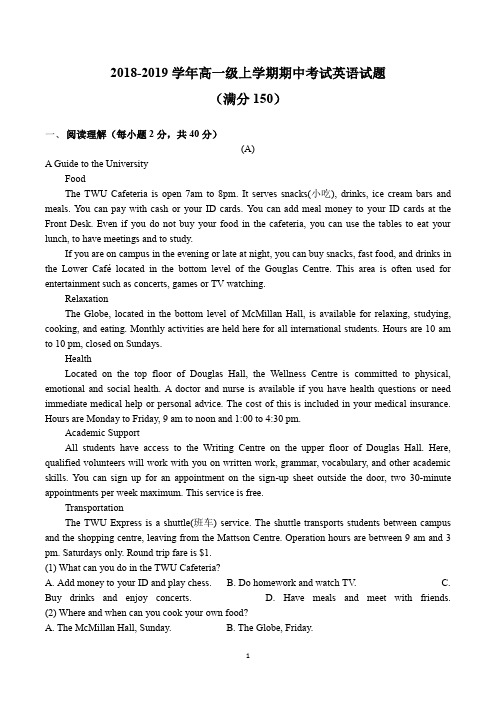
2018-2019学年高一级上学期期中考试英语试题(满分150)一、阅读理解(每小题2分,共40分)(A)A Guide to the UniversityFoodThe TWU Cafeteria is open 7am to 8pm. It serves snacks(小吃), drinks, ice cream bars and meals. You can pay with cash or your ID cards. You can add meal money to your ID cards at the Front Desk. Even if you do not buy your food in the cafeteria, you can use the tables to eat your lunch, to have meetings and to study.If you are on campus in the evening or late at night, you can buy snacks, fast food, and drinks in the Lower Cafélocated in the bottom level of the Gouglas Centre. This area is often used for entertainment such as concerts, games or TV watching.RelaxationThe Globe, located in the bottom level of McMillan Hall, is available for relaxing, studying, cooking, and eating. Monthly activities are held here for all international students. Hours are 10 am to 10 pm, closed on Sundays.HealthLocated on the top floor of Douglas Hall, the Wellness Centre is committed to physical, emotional and social health. A doctor and nurse is available if you have health questions or need immediate medical help or personal advice. The cost of this is included in your medical insurance. Hours are Monday to Friday, 9 am to noon and 1:00 to 4:30 pm.Academic SupportAll students have access to the Writing Centre on the upper floor of Douglas Hall. Here, qualified volunteers will work with you on written work, grammar, vocabulary, and other academic skills. You can sign up for an appointment on the sign-up sheet outside the door, two 30-minute appointments per week maximum. This service is free.TransportationThe TWU Express is a shuttle(班车) service. The shuttle transports students between campus and the shopping centre, leaving from the Mattson Centre. Operation hours are between 9 am and 3 pm. Saturdays only. Round trip fare is $1.(1) What can you do in the TWU Cafeteria?A. Add money to your ID and play chess.B. Do homework and watch TV.C. Buy drinks and enjoy concerts.D. Have meals and meet with friends.(2) Where and when can you cook your own food?A. The McMillan Hall, Sunday.B. The Globe, Friday.C. The Lower Café, Sunday.D. The TWU Cafeteria, Friday.(3) The Guide tells us that the Wellness Centre ________.A. gives advice on mental healthB. is open six days a weekC. offers services free of chargeD. trains students in medical care(4) How can you seek help from the Writing Centre?A. By going to the centre directly.B. By applying online.C. By calling the centre.D. By filling in a sign-up form.(B)Goodreads recommends the following books you want to read for the event to come.1).The Lyrics: 1961-2012By Bob DylanSimon & Schuster,$60What it's about: This heavy,well-timed publication contains lyrics by the songwriter who just won the Nobel Prize in Literature,from his first album,Bob Dylan,through Tempest.What's to love: The times may be changing,but Dylan's fans are a constant,traditional devotees who will want this epic collection for their shelves,to sit beside those beloved old large papers.2).Taylor Swift: This Is Our SongBy Tyler ConroySimon & Schuster,$28What it's about: An elegant fanzine celebrating all things about Taylor Swift,especially the pop star's countless fans. What's to love: Mom and/or Dad,the fan of Taylor Swift,will think you're pretty cool if he or she discovers this temple to Taylor under the Christmas tree (even if it is a book).3).Misty CopelandBy Gregg DelmanRizzoli,$39.95What it's about: Star-figure female ballet dancer Misty Copeland strikes a pose(95,to be exact) in photos taken between 2011 and 2014,in the casual setting of dance studios.What's to love: Since becoming the first African American woman to be named a principal dancer with the American Ballet Theatre,Copeland has become a cultural phenomenon,and Delman's arresting pictures capture(捕捉)her muscular power and elegance.4).@ NatGeo: The Most Popular Instagram PhotosBy National GeographicNational Geographic,$19.95What it's about: National Geographic's popular Instagram account(nearly 63 million followers) comes to book form in this title filled with eye-popping images from around the world.What's to love: Here's proof that NatGeo's talented photographers have conquered social media while maintaining the usual quality of their work.And for fans of more traditional coffee-table-size books,check out National Geographic's Wild,Beautiful Places:Picture-Perfect Journeys Around theGlobe ($40).(1) Which author is noted for literature achievements?A. National Geographic.B. Bob Dylan.C. Tyler Conroy.D. Gregg Delman.(2) For what event are the books most probably recommended?A. Literature awards.B. New Year's Day.C. Christmas Day.D. One's anniversary.(3) How much would a photographer normally spend on his favourite books listed?A. $99.9.B. $39.95.C. $19.95.D. $59.9.(4) Which book would a pop star's fan probably buy?A. @ NatGeo: The Most Popular Instagram Photos.B. The Lyrics: 1961-2012 .C. Taylor Swift: This Is Our Song.D. Misty Copeland.(C)Water is very important to living things. Without water there can be no life on the earth. All animals and plants need water. Man also needs water. We need water to drink, to cook our food and to clean ourselves. Water is needed in offices, factories and schools. Water is needed everywhere.There is water in seas, rivers and lakes. Water is found almost everywhere. Even in the desert part of the world, there is some water in the air. You can't see or feel it when it is a part of the air. The water in the seas, rivers and lakes is a liquid, the water in the air is a gas, and we call it water vapor (蒸汽).Clouds are made of water. They may be made of very small drops of water. They may also be made of snow crystals(结晶体). Snow crystals are very small crystals of ice. Ice is frozen water. It is a solid. There can be snow and ice everywhere in winter.Water may be a solid or a liquid or a gas. When it is a solid, it may be as hard as a stone. When it is a liquid, you can drink it. When it is a gas, you can not see or feel it.(1) Where can we find water?A. Water is found only in seas and rivers.B. We can find water when it turns into vapor.C. Water can be found almost everywhere.D. We can find water in deserts here and there.(2) Clouds are made of .A. seas, rivers and lakesB. very small drops of water or snow crystalsC. blocks of iceD. solid, liquid and gas(3) Water has three states .A. solid, vapor, snowB. solid, liquid and gasC. ice, snow and airD. drops of water, blocks of ice and crystals of water(4)We can drink water when it is .A. in the airB. a liquidC. a solidD. turned into ice(D)The word advertising refers to any kind of public announcement that brings products and services to the attention of people. Throughout history, advertising has been an effective way to promote(促进)the trading and selling of goods. In the Middle Ages, merchants employed "town criers" to read public messages aloud to promote their goods. When printing was invented in the fifteenth century, pages of advertisements(ads)could be printed easily and were either hung in public places or put in books.By the end of the seventeenth century, when newspapers were beginning to be read by more people, printed materials became an important way to promote products and services. The London Gazette was the first newspaper to set aside a place just for advertising. This was so successful that by the end of the century several companies started businesses for the purpose of making newspaper ads for merchants.Advertising spread quickly throughout the eighteenth century. Ad writers were starting to pay more attention to the design of the ad text. Everything, from clothes to drinks, was promoted with clever methods such as repetition of the firm's name or product, words organized in eyecatching patterns, the use of pretty pictures and expressions easy to remember.Near the end of the nineteenth century, companies that were devoted to the production of ads came to be known as "advertising agencies(广告商)."The agencies developed new ways to get people to think of themselves as members of a group. Throughout the twentieth century, advertising agencies promoted consumerism(消费主义)as a way of life, spreading the belief that people could be happy only if they bought the "right" products.(1) What was advertising like in the Middle Ages?A. Ad signs were put up in towns.B. Ad messages were shouted out in public places.C. Merchants were employed to promote products.D. Product information was included in books.(2) What does the word "This" in Paragraph 2 refer to?A. Working with ad agencies.B. Advertising in newspapers.C. Including pictures in ads.D. Selling goods in markets.(3) The 18th century advertising was special in its________.A. printing materialsB. growing spendingC. attractive designsD. advertising companies(4) Which of the following might be the best title for the text?A. The Development of Printing for AdvertisingB. The Story of AdvertisingC. The Value of Advertising DesignsD. The Role of Newspaper Advertising(E)I travel a lot, and I find out different “styles” of directions every time I ask “How can I get to the post office?”Foreign tourists are often confused in Japan because most streets there don't have names; in Japan, people use landmarks(地标)in their directions instead of street names. For example, the Japanese will say to travelers, “Go straight down to the corner. Turn left at the big hotel and go past a fruit market. The post office is across fr om the bus stop.”In the countryside of the American Midwest, there are not usually many landmarks. There are no mountains, so the land is very flat; in many places there are no towns or buildings within miles. Instead of landmarks, people will tell you directions and distances. In Kansas or Iowa, for example, people will say, “Go north two miles. Turn east, and then go another mile.”People in Los Angeles, California, have no idea of distance on the map; they measure distance in time, not miles. “How far away is the post office?” you ask. “Oh,” they answer, “it's about five minutes from here.” You say, “Yes, but how many miles away is it?” They don't know.It's true that a person doesn't know the answer to your question sometimes. What happens in such a situation? A New Yorker might say, “Sorry, I have no idea.” But in Yucatan, Mexico, no one answers “I don't know.” People in Yucatan believe that “I don't know” is impolite. They usually give an answer, often a wrong one. A tourist can get very, very lost in Yucatan!(1) When a tourist asks the Japanese the way to a certain place they usually _________.A. tell him the names of the streetsB. describe the place carefullyC. refer to well-known buildings and placesD. show him a map of the place(2) Which is the place where people measure distance in time?A. Iowa.B. New York.C. Kansas.D. Los Angeles.(3) People in Yucatan may give a tourist a wrong answer ________.A. so as to be politeB. in order to save timeC. as a testD. for fun(4) What can we infer from the text?A. New Yorkers are generally friendly to visitors.B. It's useful for travelers to know how to ask the way properly.C. People have similar understandings of politeness.D. It's important for travelers to understand cultural differences.二、完形填空(每小题1.5分,共15分)Most people in school liked Gloria. So when she got sick, some boys 1 to visit her. But none of them wanted to spend any money for a gift to bring along.Then Willie said, “We can 2 some flowers from a grave.”Gloria will not know 3 they come from, and the dead man will not hate them.Everybody was afraid, 4 Willie. So he went alone and 5 some beautiful flowers. Then they went to Gloria's room, and the boys acted as if the flowers were from all of them, but Willie did not mind.After their visit, Willie 6 the other boys, “It is a good thing that I was not afraid. Gloria liked the flowers.”The other boys laughed. Gloria would not have liked the 7 if she had known they had come from a grave.That night, Willie was reading a book when hi s mother came into his room. “Willie, did you and other boys buy some flowers today 8 Gloria?” she asked. “There's a man outside asking for you,” she added. “He says that you didn't 9 the flowers.”“What does he look like?” Willie asked.“That's hard to say,” Willie's mother answered. “He is all covered with mud.”Willie, all of a sudden, turned 10 .1. A. thought B. asked C. planned D. took2. A. steal B. pick up C. buy D. plant3. A. how B. where C. when D. why4. A. beside B. besides C. including D. except5. A. saw B. thought C. looked for D. found6. A. ordered B. asked C. said to D. explained7. A. boys B. flowers C. secret D. news8. A. to B. for C. on D. with9. A. ask for B. water C. like D. pay for10. A. sad B. red C. pale D. glad三、语法填空(每小题1.5分,共15分)Chaplin was an extraordinary performer _1________ starred in and directed many outstanding comedies. Few people were bored _2_______(watch) his moustache, his gestures or his entertaining reactions when chased by _3_______(detective). Being drunk, sliding on a banana skin or whispering _4______ (he) own failures to nobody, he made us feel more satisfied _5_______our life without any verbal explanation. His particular sense of humor has astonished everybody throughout the world up to now.In a small budget film, he played a badly-off person _6_______(wear) worn-out shoes and_7_______(mess) clothes. On one occasion, he _8_______(trap) by a snowstorm in a vast mountainous area. He overcame many difficulties, _9_______ he was not lucky enough. With all the porridge eaten up, he picked out _10_____ shoe and boiled it to eat. What he performed was a total failure.四、词汇基础(共55分)1.结合词性,翻译下列单词(每空1分,共25分)略,见答题卡2.根据语境或提示,用单词的正确形式补全句子(每空1分,共20分)1)Li Hua went home when he was ________ trouble.2)She didn’t do her homework _______ purpose.3)This morning he was late for school _______ usual.4)Because _______ your laziness, you failed the exam again!5)He does not like English at all, so it is a s____________ for him to take an English class.6)Everyone was surprised that a 3-year-old Chinese boy could speak English so f___________.7)Whenever I am in trouble, she is always w________ to give me a hand.8)We should p________ wild animals from being killed by the hunters.9)After they g________ from university, they still kept in touch with each other.10)58. I still r_________ Edward immediately at the Halloween party even if he wore a frighteningmask(面具).11)We are in complete ____________ (ignore) of his plans.12)As a ________ (devote) teacher , he could hardly spare any time to accompany his family.13)It took several hours before the volunteers sent the people ________ (injure) in the car accidentto the nearby hospital.14)Judging from the evidence, what he said is ________ (rely).15)It is such an attractive job that more than 100 ________ (apply) come to the interview.16)Children must be ____________ (educate) to serve their country when they grow up.17)I am not ____________ (entire) happy about the proposal.18)The ____________ (express) on his face suggested that he was a little nervous.19)People in Wenchuan, Sichuan Province are quite _________ (感激) to the army for what theydid after the 2008 earthquake.20)The farmers were forced, not ___________ (说服) to sell their fields to the property developer ata very low price.3.写出下列不规则动词的正确形式或翻译(每空1分,共10分)略,见答题卡。
2018—2019学年度上学期高一期中检测英语试题(附答案及听力材料)

2018—2019学年度上学期高一期中检测英语试题时限:120分钟满分:150分第Ⅰ卷第一部分听力(共两节,满分30分)做题时,先将答案标在试卷上,录音内容结束后,你将有两分钟的时间将试卷上的答案转涂到答题卡上。
第一节(共5小题;每小题1.5分,满分7.5 分)听下面5段对话,每段对话后有一个小题。
从题中所给的A、B、C三个选项中选出最佳选项,并标在试卷的相应位置。
听完每段对话后,你都有10秒钟的时间来回答有关小题和阅读下一小题。
每段对话仅读一遍。
例:How much is the shirt?A. £ 19.15.B. £ 9.15.C. £ 9.18.答案是B。
1. What does the woman mean?A. She used to swim frequently.B. She is good at swimming.C. She cannot swim at all.2. Where are the speakers?A. In the office.B. In the restaurant.C. At the airport.3. What are the two speakers talking about?A. The man’s health.B. The man’s language learning.C. The man’s plan.4. Which person does the woman prefer?A. Carl.B. Bob.C. Neither.5. What will the weather be like?A. Hot.B. Cold.C. Wet.第二节(共15小题;每小题1.5分,满分22.5分)听下面5段对话或独白。
每段对话或独白后有几个小题,从题中所给的A、B、C三个选项中选出最佳选项,并标在试卷的相应位置。
2018-2019学年高一英语上学期期中试题_23
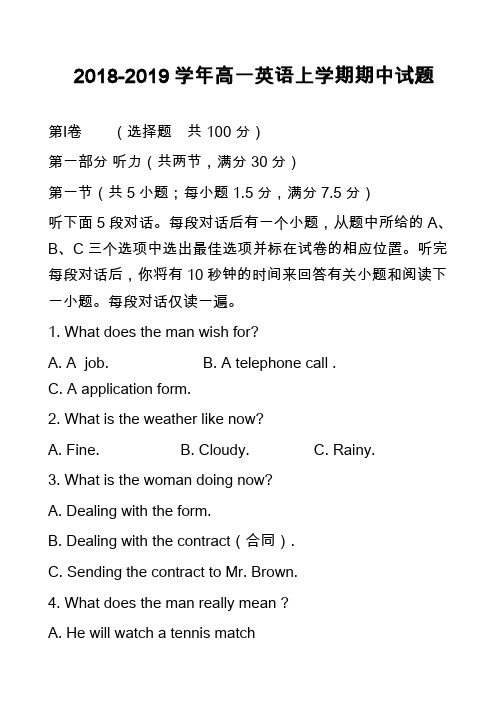
2018-2019学年高一英语上学期期中试题第Ⅰ卷(选择题共 100 分)第一部分听力(共两节,满分30分)第一节(共5小题;每小题1.5分,满分7.5分)听下面5段对话。
每段对话后有一个小题,从题中所给的A、B、C三个选项中选出最佳选项并标在试卷的相应位置。
听完每段对话后,你将有10秒钟的时间来回答有关小题和阅读下一小题。
每段对话仅读一遍。
1. What does the man wish for?A. A job.B. A telephone call .C. A application form.2. What is the weather like now?A. Fine.B. Cloudy.C. Rainy.3. What is the woman doing now?A. Dealing with the form.B. Dealing with the contract(合同).C. Sending the contract to Mr. Brown.4. What does the man really mean ?A. He will watch a tennis matchB. He will shop with the woman.C. He will go shopping on his own.5. What time is it now according to the conversation?A. At 8:00.B. At 8:30.C. At 8:45.第二节(共1 5小题;每小题1. 5分,满分22. 5分)听下面5段对话或独白。
每段对话或独白后有几个小题,从题中所给的A、B、C三个选项中选出最佳选项,并标在试卷的相应位置。
听每段对话或独白前,你将有时间阅读各个小题,每小题5秒钟;听完后,各小题给出5秒钟的作答时间。
每段对话或独白读两遍。
听第6段材料, 回答第6、7题。
2018-2019学年高一英语上学期期中试题(含解析)
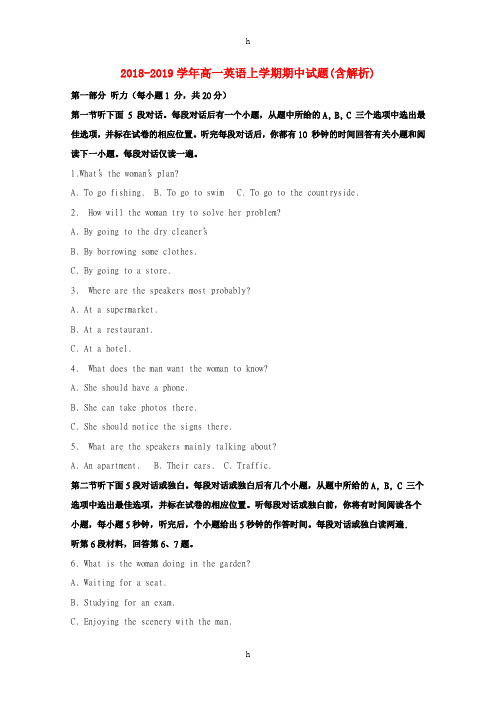
2018-2019学年高一英语上学期期中试题(含解析)第一部分听力(每小题1 分,共20分)第一节听下面 5 段对话。
每段对话后有一个小题,从题中所给的A, B, C 三个选项中选出最佳选项,并标在试卷的相应位置。
听完每段对话后,你都有10 秒钟的时间回答有关小题和阅读下一小题。
每段对话仅读一遍。
1.What’s the woman’s plan?A. To go fishing.B. To go to swimC. To go to the countryside.2. How will the woman try to solve her problem?A. By going to the dry cleaner’sB. By borrowing some clothes.C. By going to a store.3. Where are the speakers most probably?A. At a supermarket.B. At a restaurant.C. At a hotel.4. What does the man want the woman to know?A. She should have a phone.B. She can take photos there.C. She should notice the signs there.5. What are the speakers mainly talking about?A. An apartment.B. Their cars.C. Traffic.第二节听下面5段对话或独白。
每段对话或独白后有几个小题,从题中所给的A, B, C 三个选项中选出最佳选项,并标在试卷的相应位置。
听每段对话或独白前,你将有时间阅读各个小题,每小题5秒钟,听完后,个小题给出5秒钟的作答时间。
每段对话或独白读两遍.听第6段材料,回答第6、7题。
江苏省阜宁中学2018-2019学年高一上学期期中考试英语试题
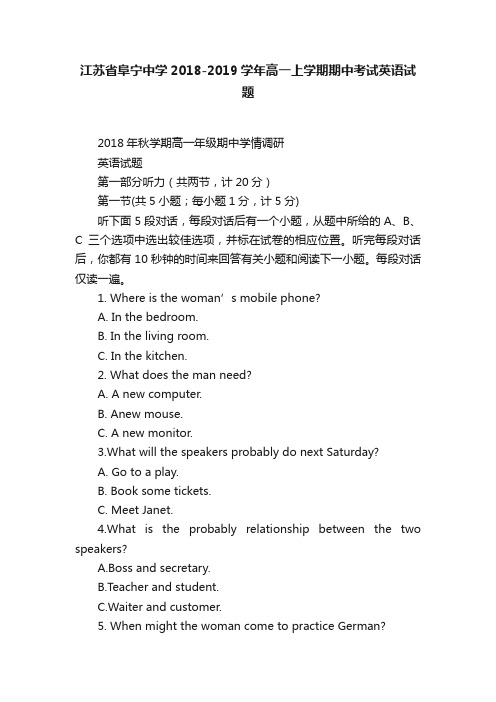
江苏省阜宁中学2018-2019学年高一上学期期中考试英语试题2018年秋学期高一年级期中学情调研英语试题第一部分听力(共两节,计20分)第一节(共5小题;毎小题1分,计5分)听下面5段对话,每段对话后有一个小题,从题中所给的A、B、C三个选项中选出较佳选项,并标在试卷的相应位置。
听完每段对话后,你都有10秒钟的时间来回答有关小题和阅读下一小题。
每段对话仅读一遍。
1. Where is the woman’s mobile phone?A. In the bedroom.B. In the living room.C. In the kitchen.2. What does the man need?A. A new computer.B. Anew mouse.C. A new monitor.3.What will the speakers probably do next Saturday?A. Go to a play.B. Book some tickets.C. Meet Janet.4.What is the probably relationship between the two speakers?A.Boss and secretary.B.Teacher and student.C.Waiter and customer.5. When might the woman come to practice German?A. On Tuesday.B. On Wednesday.C. On Friday.第二节(共15小题;每小题1分,计15分)听下面5段对话或独白"毎段对话或独白有几个小题,从题中所给的A、B, C三个选项中选出最佳选项,并标在试卷的相应位置。
听每段对沽或独白前,你将有时间阅读各个小题,每小题5 秒钟;听完后,各小题将给出5秒钟的作答时间,每段对话或独白读两遍。
2018-2019学年高一英语上学期期中试题_16

2018-2019学年高一英语上学期期中试题注意事项:1.答第Ⅰ卷时,考生务必将自己的姓名、准考证号填写在答题卡上。
2.选出每小题答案后,用2B铅笔把答题卡上对应题目的答案标号涂黑,如需改动,用橡皮擦干净后,再选涂其他答案标号框。
不能答在试卷上,否则无效。
第一部分听力(共两节,满分30分)(共5小题;每小题1.5分,满分7.5分)听下面5段对话。
每段对话后有一个小题,从题中所给的A、B、C三个选项中选出最佳选项,并标在试卷的相应位置。
听完每段对话后,你都有10秒钟的时间来回答有关小题和阅读下一小题。
每段对话仅读一遍。
1. Why is Ann so upset?A. She failed one of her exams.B. She is worrying about other lessons.C. She has no time to do her math homework.2. What type of food does the woman eat?A. Junk food.B. Healthy food.C. Delivered food.3. What will the man probably do to stay warm?A. Use a blanket.B. Turn on the heater(加热器).C. Drink some hot chocolate.4. What are the speakers mainly talking about?A. The man’s career.B. The man’s travel plan.C. The man’s plan after graduating.5. What are the speakers’ opinions about the painting?A. It’s simple.B. It’s colorful.C. It’s complex.第二节(共 15 小题;每小题1.5分,满分15分)听下面 5 段对话或独白。
2018-2019学年高一英语上学期期中试题_2
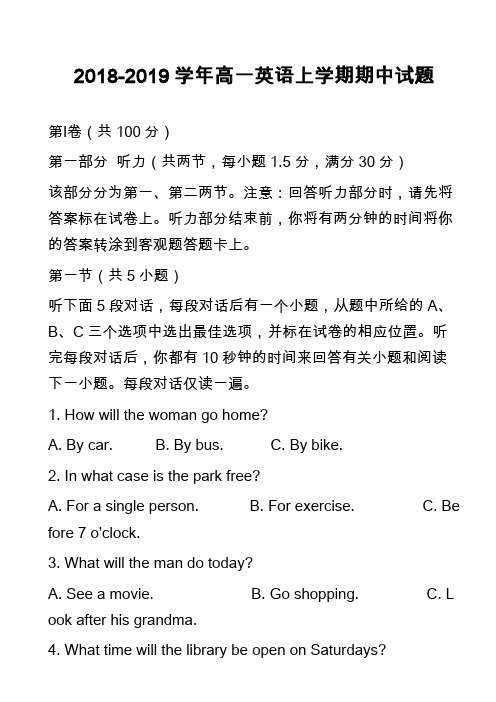
2018-2019学年高一英语上学期期中试题第Ⅰ卷(共100分)第一部分听力(共两节,每小题1.5分,满分30分)该部分分为第一、第二两节。
注意:回答听力部分时,请先将答案标在试卷上。
听力部分结束前,你将有两分钟的时间将你的答案转涂到客观题答题卡上。
第一节(共5小题)听下面5段对话,每段对话后有一个小题,从题中所给的A、B、C三个选项中选出最佳选项,并标在试卷的相应位置。
听完每段对话后,你都有10秒钟的时间来回答有关小题和阅读下一小题。
每段对话仅读一遍。
1. How will the woman go home?A. By car.B. By bus.C. By bike.2. In what case is the park free?A. For a single person.B. For exercise.C. Be fore 7 o’clock.3. What will the man do today?A. See a movie.B. Go shopping.C. L ook after his grandma.4. What time will the library be open on Saturdays?A. 8:00 a.m. to 9:00 p.m.B. 9:00 a.m. to 5:00 p.m.C. Closed.5. Where does the man live now?A. In England.B. In America.C. In India.第二节(共15小题)听下面5段对话。
每段对话后有几个小题,从题中所给的A、B、C三个选项中选出最佳选项,并标在试卷的相应位置。
听每段对话前,你将有时间阅读各个小题,每小题5秒钟;听完后,各小题将给出5秒钟的作答时间。
每段对话读两遍。
听第6段材料,回答第6、7题。
6. What are the speakers mainly talking about?A. School life.B. Different cultures.C. Their teachers.7. Which subject does the woman dislike?A. History.B. English.C. M ath.听第7段材料,回答第8、9题。
2018-2019学年高一英语上学期期中试题_10
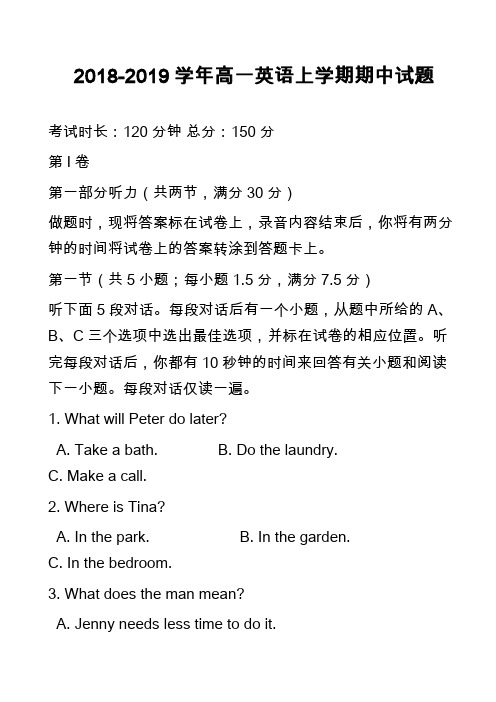
2018-2019学年高一英语上学期期中试题考试时长:120分钟总分:150分第I卷第一部分听力(共两节,满分30分)做题时,现将答案标在试卷上,录音内容结束后,你将有两分钟的时间将试卷上的答案转涂到答题卡上。
第一节(共5小题;每小题1.5分,满分7.5分)听下面5段对话。
每段对话后有一个小题,从题中所给的A、B、C三个选项中选出最佳选项,并标在试卷的相应位置。
听完每段对话后,你都有10秒钟的时间来回答有关小题和阅读下一小题。
每段对话仅读一遍。
1. What will Peter do later?A. Take a bath.B. Do the laundry.C. Make a call.2. Where is Tina?A. In the park.B. In the garden.C. In the bedroom.3. What does the man mean?A. Jenny needs less time to do it.B. Jenny needs one hour to do it.C. The rest don’t want to do it.4. What does the man want?A. A blue sweater.B. A purple sweater.C. A blue coat.5. What does the man advise the woman to do?A. Count numbers.B. Try some pills.C. Listen to s ome rock music.第二节(共15小题:每小题1.5分,满分22.5分)听第6段材料,回答第6、7题。
6. What is the news about?A. A match.B. A party.C. A concert.7. What are they going to do tomorrow?A. Do some shopping.B. Go to Helen’s Park.C. Prepare some food.听第7段材料,回答第8至10题。
2018-2019学年高一英语上学期期中试题_6
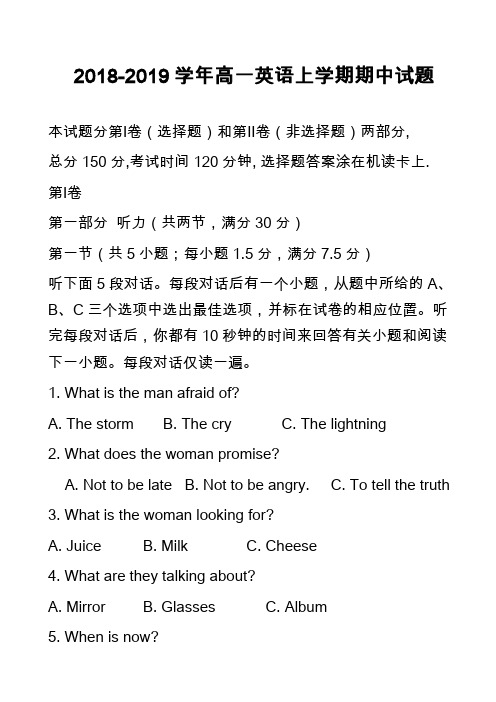
2018-2019学年高一英语上学期期中试题本试题分第Ⅰ卷(选择题)和第Ⅱ卷(非选择题)两部分,总分150分,考试时间120分钟, 选择题答案涂在机读卡上.第Ⅰ卷第一部分听力(共两节,满分30分)第一节(共5小题;每小题1.5分,满分7.5分)听下面5段对话。
每段对话后有一个小题,从题中所给的A、B、C三个选项中选出最佳选项,并标在试卷的相应位置。
听完每段对话后,你都有10秒钟的时间来回答有关小题和阅读下一小题。
每段对话仅读一遍。
1. What is the man afraid of?A. The stormB. The cryC. The lightning2. What does the woman promise?A. Not to be lateB. Not to be angry.C. To tell the truth3. What is the woman looking for?A. JuiceB. MilkC. Cheese4. What are they talking about?A. MirrorB. GlassesC. Album5. When is now?A. MorningB. AfternoonC. Night第二节(共15小题:每小题1.5分,满分22.5分)听下面5段对话或独白。
每段对话或独白后有几个小题,从题中所给的A、B、C三个选项中选出最佳选项,并标在试卷的相应位置。
听每段对话或独白前,你将有时间阅读各个小题,每小题5秒钟;听完后每个小题将给出5秒钟的作答时间。
每段对话或独白读两遍。
听第6段材料,回答6、7题。
6. Why does the man look so upset and tired?A. His father is ill.B. His father failed in business.C. His parents divorced.7. What has the man done to help his family?A. Quit his jobB. Founded a companyC. Had a job 听第7段材料,回答第8、9题。
2018—2019学年第一学期高一年级期中考试英语试题
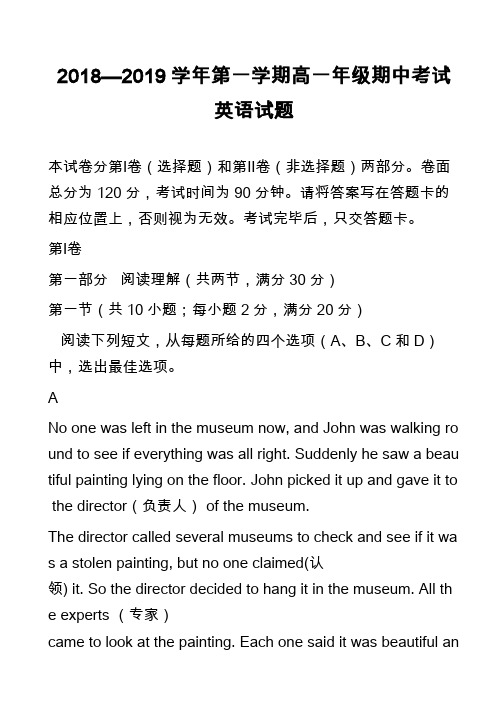
2018—2019学年第一学期高一年级期中考试英语试题本试卷分第Ⅰ卷(选择题)和第Ⅱ卷(非选择题)两部分。
卷面总分为120分,考试时间为90分钟。
请将答案写在答题卡的相应位置上,否则视为无效。
考试完毕后,只交答题卡。
第Ⅰ卷第一部分阅读理解(共两节,满分30分)第一节(共10小题;每小题2分,满分20分)阅读下列短文,从每题所给的四个选项(A、B、C和D)中,选出最佳选项。
ANo one was left in the museum now, and John was walking ro und to see if everything was all right. Suddenly he saw a beau tiful painting lying on the floor. John picked it up and gave it to the director(负责人) of the museum.The director called several museums to check and see if it wa s a stolen painting, but no one claimed(认领) it. So the director decided to hang it in the museum. All th e experts (专家)came to look at the painting. Each one said it was beautiful and had very deep meaning. The director was proud to have suc h a painting in his museum and congratulated John on his dis covery.Some weeks later a woman and her little son came to the mu seum. While they were looking at the new painting, the little b oy began to cry. The director went over and asked him. “Why are you crying?”The child pointed to the painting and said, “That’s my painting on the wall and I want it back.”“Yes,” said his mother, “he left it on the floor a few weeks ago. If you look carefully, you can see his name on the painting.”1. John was perhaps _______.A. a painterB. an expert on paintingC. a visitor to the museumD. a man working in the mus eum2. John found the painting _______.A. before the museum openedB. after the museum was closedC. during his visit to the museumD. while he was enjoying his walk3. The boy began to cry before the painting because _______.A. he was afraid of itB. he thought it was his paintingC. he wanted to have the painting backD. Both B and C4. After the director heard what the woman and the boy said, he must be very _______.A. angryB. afraidC. proudD. surprised5. All the experts thought the painting good because _______.A. it was really very beautiful and had very deep meaningB. the painting was drawn by a famous painter though he was a childC. none of them looked carefully enoughD. they examined it very carefullyD. women like their men friends to be generousBIf you do not use your arm or your legs for some time, they be come weak; when you start using them again, they slowly bec ome strong again. Everybody knows that. Yet many people d o not seem to know that memory(记忆力) works in the same way. When someone says that he has a good memory, he really means that he keeps his memory in practice by using it. When someone else says that his mem ory is poor, he really means that he does not give it enough c hance to become strong. If a friend says that his arms and leg s are weak, we know that it is his own fault(过错). But if he tells us that he has a poor memory, many of us t hink that his parents are to blame(受责备), and few of us know that it is just his own fault. Have you e ver found that some people can’t read or write but usually the y have better memories? This is because they cannot read or write and they have to remember things; they cannot write do wn in a little notebook. They have to remember days, names, songs and stories; so their memory is the whole time being ex ercised. So if you want to have a good memory, learn from the people: Practice remembering.6. The main reason for one’s poor memory is that _______.A. his father or mother may have a poor memoryB. He does not use his name or legs for some timeC. his memory is not often usedD. he can’t read or write7. If you do not use your arms or legs for some time _______.A. you can’t use them any moreB. they will become strongerC. they become weak and won’t become strong until you use them again.D. they will become neither stronger nor weaker8. Which of the following is NOT true?A. Your memory works in the same way as your arms or legs.B. Your memory, like your arms or legs, becomes weak if you don’t give it enough chance for practice.C. Don’t learn how to read and write if you want to have a bett er memory.D. A good memory comes from more practice.9. Some people can’t read or write, but they usually have bett er memories, because _______.A. they have save much troubleB. they have saved much time to remember thingsC. they have to use their memories all the timeD. they can’t write everything in a little notebook10. Which is the best title for this passage?A. Don’t Stop Using Your Arms Or LegsB. How To Have a Good MemoryC. Strong Arms And Good MemoriesD. Learn From the People第二节(共5小题;每小题2分,满分10分)根据短文内容,从短文后的选项中选出能填入空白处的最佳选项。
2018-2019学年度第一学期期中考试高一英语试题
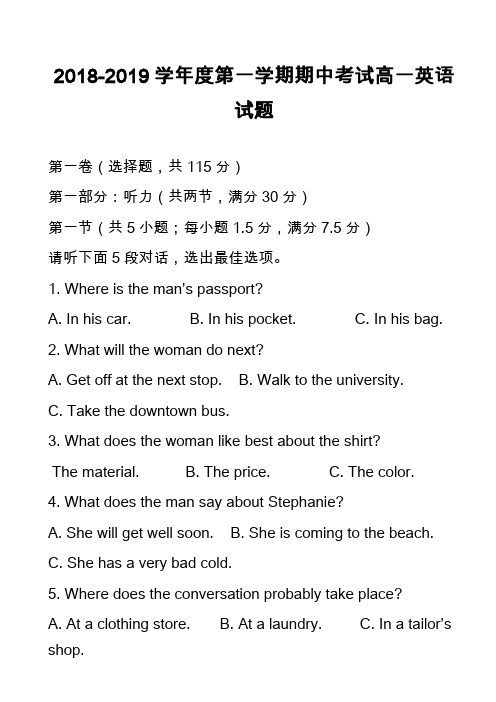
2018-2019学年度第一学期期中考试高一英语试题第一卷(选择题,共115分)第一部分:听力(共两节,满分30分)第一节(共5小题;每小题1.5分,满分7.5分)请听下面5段对话,选出最佳选项。
1. Where is the man’s passport?A. In his car.B. In his pocket.C. In his bag.2. What will the woman do next?A. Get off at the next stop.B. Walk to the university.C. Take the downtown bus.3. What does the woman like best about the shirt?The material. B. The price. C. The color.4. What does the man say about Stephanie?A. She will get well soon.B. She is coming to the beach.C. She has a very bad cold.5. Where does the conversation probably take place?A. At a clothing store.B. At a laundry.C. In a tailor’s shop.第二节(共5小题;每小题1.5分,满分22.5分)请听下面5段对话或独白,选出最佳选项。
请听第6段材料,回答第6、7题。
6. According to the man, what is special at the Salvadoran res taurant?A. Corn pancakes.B. A certain kind of soup.C. A special drink.7. Where is El Salvador?A. In Central America.B. In South America.C. In the no rth of Mexico.请听第7段材料,回答第8、9题。
2018-2019学年高一英语上学期期中试卷(含解析) (IV)
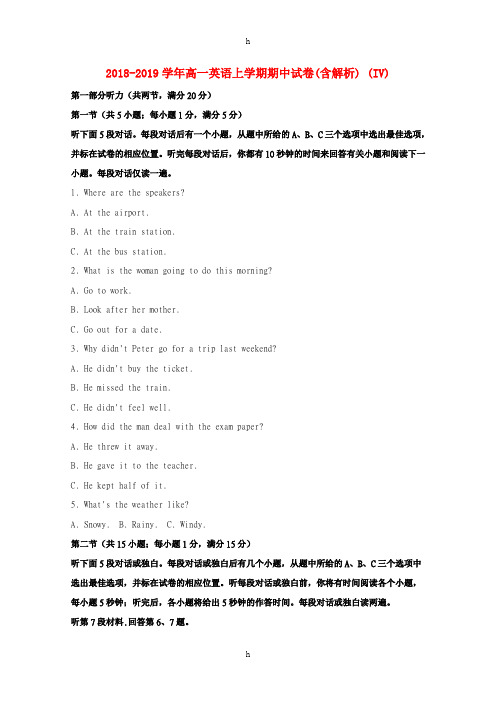
2018-2019学年高一英语上学期期中试卷(含解析) (IV)第一部分听力(共两节,满分20分)第一节(共5小题;每小题1分,满分5分)听下面5段对话。
每段对话后有一个小题,从题中所给的A、B、C三个选项中选出最佳选项,并标在试卷的相应位置。
听完每段对话后,你都有10秒钟的时间来回答有关小题和阅读下一小题。
每段对话仅读一遍。
1. Where are the speakers?A. At the airport.B. At the train station.C. At the bus station.2. What is the woman going to do this morning?A. Go to work.B. Look after her mother.C. Go out for a date.3. Why didn't Peter go for a trip last weekend?A. He didn't buy the ticket.B. He missed the train.C. He didn't feel well.4. How did the man deal with the exam paper?A. He threw it away.B. He gave it to the teacher.C. He kept half of it.5. What's the weather like?A. Snowy.B. Rainy.C. Windy.第二节(共15小题;每小题1分,满分15分)听下面5段对话或独白。
每段对话或独白后有几个小题,从题中所给的A、B、C三个选项中选出最佳选项,并标在试卷的相应位置。
听每段对话或独白前,你将有时间阅读各个小题,每小题5秒钟;听完后,各小题将给出5秒钟的作答时间。
每段对话或独白读两遍。
听第7段材料.回答第6、7题。
江苏省阜宁中学2018_2019学年高一英语上学期期中试题
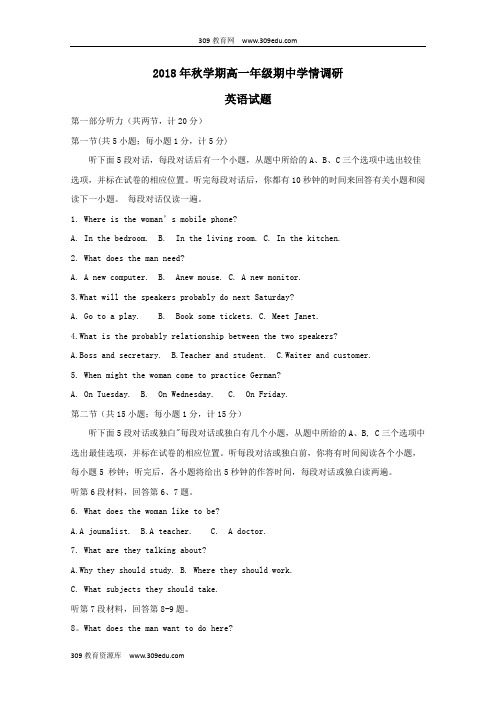
2018年秋学期高一年级期中学情调研英语试题第一部分听力(共两节,计20分)第一节(共5小题;毎小题1分,计5分)听下面5段对话,每段对话后有一个小题,从题中所给的A、B、C三个选项中选出较佳选项,并标在试卷的相应位置。
听完每段对话后,你都有10秒钟的时间来回答有关小题和阅读下一小题。
每段对话仅读一遍。
1. Where is the woman’s mobile phone?A. In the bedroom.B. In the living room.C. In the kitchen.2. What does the man need?A. A new computer.B. Anew mouse.C. A new monitor.3.What will the speakers probably do next Saturday?A. Go to a play.B. Book some tickets.C. Meet Janet.4.What is the probably relationship between the two speakers?A.Boss and secretary.B.Teacher and student.C.Waiter and customer.5. When might the woman come to practice German?A. On Tuesday.B. On Wednesday.C. On Friday.第二节(共15小题;每小题1分,计15分)听下面5段对话或独白"毎段对话或独白有几个小题,从题中所给的A、B, C三个选项中选出最佳选项,并标在试卷的相应位置。
听每段对沽或独白前,你将有时间阅读各个小题,每小题5 秒钟;听完后,各小题将给出5秒钟的作答时间,每段对话或独白读两遍。
听第6段材料,回答第6、7题。
6. What does the woman like to be?A.A joumalist.B.A teacher.C. A doctor.7. What are they talking about?A.Why they should study.B. Where they should work.C. What subjects they should take.听第7段材料,回答第8-9题。
19学年高一上学期期中考试英语试题(附答案)
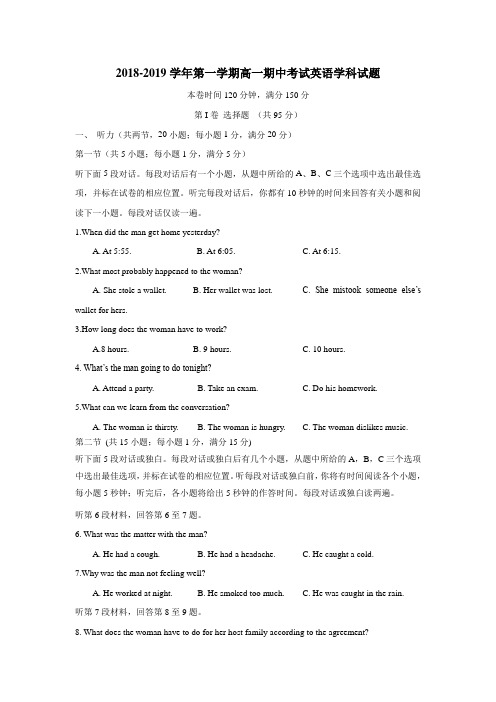
2018-2019学年第一学期高一期中考试英语学科试题本卷时间120分钟,满分150分第I卷选择题(共95分)一、听力(共两节,20小题;每小题1分,满分20分)第一节(共5小题;每小题1分,满分5分)听下面5段对话。
每段对话后有一个小题,从题中所给的A、B、C三个选项中选出最佳选项,并标在试卷的相应位置。
听完每段对话后,你都有10秒钟的时间来回答有关小题和阅读下一小题。
每段对话仅读一遍。
1.When did the man get home yesterday?A. At 5:55.B. At 6:05.C. At 6:15.2.What most probably happened to the woman?A. She stole a wallet.B. Her wallet was lost.C. She mistook someone else’s wallet for hers.3.How long does the woman have to work?A.8 hours.B. 9 hours.C. 10 hours.4. What’s the man going to do tonight?A. Attend a party.B. Take an exam.C. Do his homework.5.What can we learn from the conversation?A. The woman is thirsty.B. The woman is hungry.C. The woman dislikes music.第二节(共15 小题;每小题1分,满分15分)听下面5段对话或独白。
每段对话或独白后有几个小题,从题中所给的A,B,C三个选项中选出最佳选项,并标在试卷的相应位置。
听每段对话或独白前,你将有时间阅读各个小题,每小题5秒钟;听完后,各小题将给出5秒钟的作答时间。
2018-2019学年高一英语上学期期中试题_27
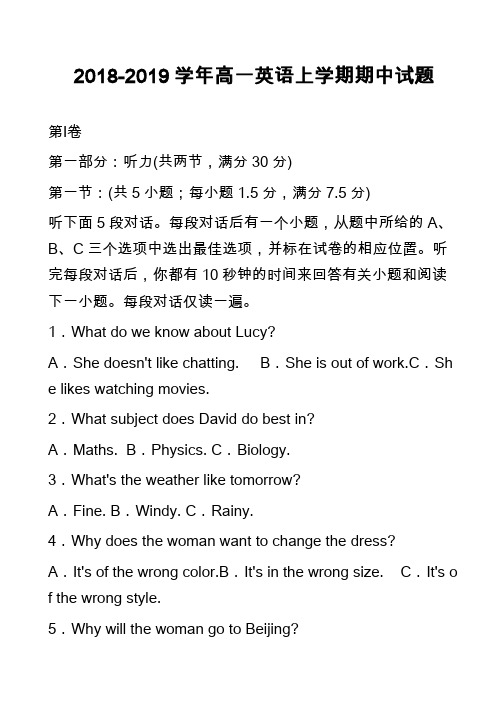
2018-2019学年高一英语上学期期中试题第Ⅰ卷第一部分:听力(共两节,满分30分)第一节:(共5小题;每小题1.5分,满分7.5分)听下面5段对话。
每段对话后有一个小题,从题中所给的A、B、C三个选项中选出最佳选项,并标在试卷的相应位置。
听完每段对话后,你都有10秒钟的时间来回答有关小题和阅读下一小题。
每段对话仅读一遍。
1.What do we know about Lucy?A.She doesn't like chatting. B.She is out of work.C.Sh e likes watching movies.2.What subject does David do best in?A.Maths. B.Physics. C.Biology.3.What's the weather like tomorrow?A.Fine. B.Windy. C.Rainy.4.Why does the woman want to change the dress?A.It's of the wrong color.B.It's in the wrong size. C.It's o f the wrong style.5.Why will the woman go to Beijing?A.She will attend college there. B.She has found a new jo b there. C.She wants to open her eyes.第二节:(共15小题;每小题1.5分,满分22.5分)听下面5段对话或独白。
每段对话或独白后有几个小题,从题中所给的A、B、C三个选项中选出最佳选项,并标在试卷的相应位置。
听每段对话或独白前,你将有时间阅读各个小题,每小题5秒钟;听完后,各小题将给出5秒钟的作答时间。
每段对话或独白读两遍。
- 1、下载文档前请自行甄别文档内容的完整性,平台不提供额外的编辑、内容补充、找答案等附加服务。
- 2、"仅部分预览"的文档,不可在线预览部分如存在完整性等问题,可反馈申请退款(可完整预览的文档不适用该条件!)。
- 3、如文档侵犯您的权益,请联系客服反馈,我们会尽快为您处理(人工客服工作时间:9:00-18:30)。
2018年秋学期高一年级期中学情调研英语试题第一部分听力(共两节,计20分)第一节(共5小题;毎小题1分,计5分)听下面5段对话,每段对话后有一个小题,从题中所给的A、B、C三个选项中选出较佳选项,并标在试卷的相应位置。
听完每段对话后,你都有10秒钟的时间来回答有关小题和阅读下一小题。
每段对话仅读一遍。
1. Where is the woman’s mobile phone?A. In the bedroom.B. In the living room.C. In the kitchen.2. What does the man need?A. A new computer.B. Anew mouse.C. A new monitor.3.What will the speakers probably do next Saturday?A. Go to a play.B. Book some tickets.C. Meet Janet.4.What is the probably relationship between the two speakers?A.Boss and secretary.B.Teacher and student.C.Waiter and customer.5. When might the woman come to practice German?A. On Tuesday.B. On Wednesday.C. On Friday.第二节(共15小题;每小题1分,计15分)听下面5段对话或独白"毎段对话或独白有几个小题,从题中所给的A、B, C三个选项中选出最佳选项,并标在试卷的相应位置。
听每段对沽或独白前,你将有时间阅读各个小题,每小题5 秒钟;听完后,各小题将给出5秒钟的作答时间,每段对话或独白读两遍。
听第6段材料,回答第6、7题。
6. What does the woman like to be?A.A joumalist.B.A teacher.C. A doctor.7. What are they talking about?A.Why they should study.B. Where they should work.C. What subjects they should take.听第7段材料,回答第8-9题。
8。
What does the man want to do here?A. Buy a car.B. Rent a car.C. Repair a car.9. What doesn't the man take with him?A. His credit card.B. His confirmation number.C. His driver's license. 听第8段材料,回答第10至12题。
10. What's the man?A.A Tennis fan.B. A reporter.C. A student.11. What is the woman doing?A. Wailing for a tennis star.B. Watching a tennis match.C.Queuing up for a tennis match.12. Where does the woman come from?A. London.B. Berlin.C. Wimbledon.听第9段材料,回答第13至16题。
13. How did the man find the movie they saw Iasi week?A. Absurd.B. Boring.C. Excellent.14.Why does the man want to see action movies in a theatre?A.To enjoy them on a big screen.B.To enjoy them with many oihers.C.To have popcorn for dinner there.15. Which is the woman's favourite?A. Seafood and chicken.B. Meat and love stories.C.Fish and action movies.16. What is the talk mainly about?A. Their past experience.B. Their likes and dislikes.C. Their plan for the night.听第10段材料,回答第17至20题。
17. In which country do children sing songs of spring on May Day?A. France.B. Greece.C.Italy.18.How do children in England deal with the pennies?A.Buy some flowers.B. Buy gifts.C. Throw them into a well.19.What do children in the US do on May Day?A.Give each other gifts.B. Sing songs to each otherC.Leave flowers at the doors20. Where is the text taken from?A.A class prescnlalion.B.A TV programme.C. A radio programme.第二部分语言知识运用(计20分)第一节:完形填空(每小题1分,计20分)Do parents owe their kids anything? Starting from my position, parents do not owe their children a 21 education.If they can 22_ it, they can.23_ send them to the besi universities. But they must not feel guilty if they can’t. If the children really want to go, they’ll find a 24 . There are plenty of loans (贷款) and scholarships for the bright and 25 ones who can’t afford to pay.When children grow up and want to 26. their parents do not owe them a down payment on a house. They do not have the 27. to baby-sit their grandchildren. If they want to do it, it must be considered a _28_ not a responsibility.Do parents owe their children anything? Yes, they owe them a great deal.One of their duties is to give their children a personal 29 .A child who is constantly made to feel stupid and unworthy, constantly 30 to brighter brothers, sisters, or cousins will be so 31 ,so afraid of failing that he (or she) won't try at all. Of course they should be 32. corrected when they do wrong,but it's often better to let children learn their mistakes by themselves 33 . All our parents should do is to trust them, respect them, tolerate them and give them chances to try and fail. They must learn to stand 34.When criticisms are really needed, they should be 35 with praises, with a smile and a kiss. That is the way children learn.Parents owe their children a set of solid values around 36_ they build their lives. This means teaching them to _37_ the rights and opinions of others; it means being respectful,to ciders, to teachers, and to the law.The best way to teach such values is by 38 . A child who is lied to will lie. A child seeing no laughter and no love in the home will have laughing and loving .No child asks to be _40. If you bring a life into the world, you owe the child something.21. A.formal B.college C. usual D.foreign22. A.afford B.get C. find D.receive23. A.gradually B.hardly C. certainly D.finally24. A.supply B.help C. hand D.way25. A.handsome B.honest C. wealthy D.eager26. A.get married B.get a job C.go abroad D.live alone27. A.time B.duty C.right D.energy28. A.habit B. pleasure C. favor D.service29. A.affair B. worth C. belief D.respect30. pared B. brought C. forced D.taken31. A.unfair B. unusual C unknown D.unsure32. A.nearly B. gently C. properly D.possibly33. A.now and then B. in time C. at once D.right now34. A.failure B. honor C.progress D.test35. A.mixed B. satisfiedC.balanced D.shared36. A.which B. it C. whom D.what37. A.consider B. refuse C.respect D.know38. A.explanation B. deed C.word D.time39. A.pleasure B. freedom C.fun D.difficulty40. A.praised B. alone C. poor D.born第三部分:阅读理解(每小题2分,计30分)ARiding School:You can start horse-riding at any age. Choose private or group lessons any weekday between 9 a.m. and 8:30 p. m. (3:30 p.m. on Saturdays). There are 10 kilometres of tracks and paths for leisurely rides across farmland and open country. You will need a riding hat. Opening Hours: Monday through Friday:9:00 a.m. -8:30p.m.Phone: (412) 3964754 Fax: (412) 396-6752Sailing Club:Our Young Sailor's Course leads to the Stage Sailing qualification.You'll learn how to sail safely and the coutse also covers sailing theory and first aid. Have funwith other course members afterwards in the clubroom. There are 10 weekly two-hour lessons (Tuesdays 6p.m.〜8p,m.) Opening Hours: Tuesdays: 6:00p.m.〜8:00p.m Phone:(412)396-6644 Fax: (412)396-6644Diving Centre:Our experienced instructors offer one-month courses in deep-sea diving for beginners. There are two evening lessons a week, in which you learn to breathe underwater and use the equipment safely.You only need a swimming costume and towel. Reduced rates for couples. Opening Hours: Monday and Friday:6:30p.m. - 8:30pmPhone: (412)3%-6312 Fax: (412) 396-6706Medical Center:The staff of the Medical Center aim to provide convenient and comprehensive medical care to students and staff of the university. The center is well equipped and the staff here are trained to deal with a broad range of medical problems. Both female and male doctors as well as mining staff are available for consultation. Also, all kinds of medicines arc sold here and are cheaper for students than other drugstores. Opening Hours: 24 hours from Monday to SundayPhone: (412)396-6649 Fax: (412) 396-6648Watersports club:We use a two-kilometre length of river for speedboat racing, and water-skiing.A beginners' course consists often 20-minutc lessons. You will learn to handle boats safely and confidently but must be able to swim. The club is in a convenient central position and is open daily from 9 a.m. to 4 p.m., with lessons all through the day. Opening Hours: Monday through Friday: 9:00a.m. - 4:00p.mPhone: (412)396-6899 Fax: (412) 396-689041.If you want to swim and enjoy activities which are fast and a bit dangerous, you should join .A. Watersports ClubB. Riding SchoolC.Sailing ClubD. Diving Centre42. If you want to experience a new activity in the countryside in the mornings, youmay fax .A. (412) 396-6876B. (412) 396-6706C. (412)396-6648D. (412) 396-675243. If you are planning to explore the ocean depths, you should attend your lessons at .A.24 hours &om Monday to SundayB. Monday through Friday: 7:00 a.m.-10:00 p.m.C. Tuesdays: 6:00 p.m. -8:00 p.m.D. Monday and Friday: 6:30 p.m. 8:30 p.m.BI'm fat. I'm too skinny. I'd be happy if I were taller, shorter, had curly hair, straight hair, a smaller nose, bigger muscles, longer legs. Do any of these statements sound familiar? Do you often put yourself down? If so, you’re not alone.As a teen, you're going through a ton of changes in your body.And as your body changes, so does your image of yourself. Lots of people have trouble getting used to it, and this can affect their confidence.Some people think they need to change how they look or act to feel good about themselves. But actually all you need to do is change the way you see your body and how you think about yourself.The first thing to do is recognize that your body is your own, ao matter what shape, size, or color it comes in. If you’re very worried about yo ur weight or size, go to your doctor to check that things are OK. But it’s no one’s business but your own what your body is like — finally, you have to be happy with youiself.Next, find which aspects of your appearance you can change and which you can' Everyone, even the most perfect-seeming celebrity (名人), has things about themselves that they can't change and need to accept —like their height, for example, or their shoe size. If there are things about yourself that you want to change and can, do this by making goals for yourself. For example, if you want to get fit,make a plan to exercise every day and cat nutntious foods.When you hear negative comments coming from within yourself, tell yourself to stop.Try building your confidence by listing three things in your day that really gave you pleasure. It can be anything like the way the sun felt on your face, the sound of your favorite band, or the way someone laughed at your jokes.44.From the first paragraph, we can infer that .A. most teens like to have a special body imageB.teens prefer to change tbeir body image quicklyC.many teens can’t accept their body changes easilyD.teens usually change their opinions on their body image45.Which of the following does the author probably agree with?A. Change the way other people look at you .B. Realize you can't change everything about yourself.C. Learn from some celebrities on how to change your body.D. Go to your doctor for advice on how to change your body.46. The underlined phrase “put yourself down” in the first paragraph probably means .A.make yourself fall downB. write down your name somewhereC.force yourself to do somethingD. say negative things about yourselfCI will be travelling to Australia as a Student Ambassador with People to People. People to People arranges for American students lo travel all around the world to learn about other cultures, and to help others understand American culture. The program was founded by former President Dwight D. Eisenhower to promote peace through understanding .I had to put in many hours of special work to get to this point. First, a teacher nominated me, and then I attended an informational meeting about the program. The application process included an interview, and finally, I was accepted.That's when the hard work really began, In addition to attending monthly meetings to prepare for the big trip, my parents encouraged my twin sister Beth (alsoparticipating in the program) and me to raise $2,000 each to help pay for the cost. And so the fund-raising began.We did everything from selling subs and candy bars to selling an old car to decorating people's mailboxes during the holiday season. We also baby-sat,washed cars, held a yard sale, and washed windows. After months of hard work 1 had raised a total ofS2,319.87! Combined, Beth and 1 raised over S4,500. 00!Now I have a problem—packing. Yes, 1 know it sounds unimportant, but my suitcase seems to have shrunk as I placed my belongings inside. According to airline regulations, a suitcase can be no larger than 54 inches and weigh no more than 44 pounds• For a person who likes to wear a different outfit every day, packing all ray clothes into such a small space seemed an impossible task. However, I have gradually lessened ray load and my suitcase which started out weighing overweight now checks in at a mere 36 pounds. Apart from a slightly bloated (臃肿的)carry-on bag, my luggage is definitely manageable.1 doubt whether I will get much sleep tonight because I am so excited! I know that what lies ahead is going to be the trip of a lifetime!47.When docs the author write the passage?A. Several months before the journey.B. The night prior to leaving.C. Just hours after reaching the destination.D. The night when she was accepted.48. Which of the following is not the aim of People to People program?A.To promote peace through understanding.B.To make American culture known to others.C.To collect money for travelling.D.To learn about othacultures.49. Which is the correct order of the authors preparation for die journey?a.being accepted as a memberb. raising money for the tripc. attending a meeting about the programd. packing belongingse. being nominated by the teacherA.e, a, b, c, dB. a, c, e, d, bC.c, a, e, b, dD. c, c, a, b, d50. What does the author think of the journey?A.It could be a tiring, expensive journey.B.It could be a long-lasting journey, which needs taking all dailynecessities.C. It could be an oversea journey, during which she would experience hard labour.D. It could be an exciting, unforgettable journey.DDear Mr. Expert,I grew up in an unhappy and abusive home. I always promised myself that I’d get out as soon as possible.Now, at age 20, I have a good job and a nice house, and Tin really proud of the independence I've achieved.Here’s the problem: several of my f riends who still live with their parents wish they had places like mine—so much so that they make mine theirs.It started out with a couple of them spending the weekends with me.But now they seem to take it for granted that they can show up any time they like. They bring boyfriends over, talk on the phone and stay out forever.I enjoy having my friends here sometimes—it makes the place feel comfortable and warm—-but this is my home, not a party house. I am old enough to move out on my own, so why can't I seem to ask my friends to respect my privacy(私人空间)?JoanDear Joan,If your family didn't pay attention to your needs when you were a child, you probably have trouble letting others know your needs now.And if you’ve gathered your friends around you to rebuild a happy family atmosphere , you may fear that saying no will bring back the kind of conflict yougrew up with—or destroy the nice atmosphere you now enjoy. You need to understand that in true friendship it’s okay to put your own needs first from time to tim e. Be dear about the message you want to send. For example, “I really love your company but 1 also need some privacy. So please call before you come over.”Edward51.We can learn from the first letter that Joan .A.lives away from her parentsB.takes pride in her friendsC.knows Mr. Expert quite wellD.hates her parents very much52.We can infer from the first letter that .A.Joan considers her friends more important than her privacyB.Joan doesn't like the parties at allC.Joan's friends visit her more often than she can acceptD.Joan dislikes the boyfriends her friends bring over53. According to Mr. Expert, why can^ Joan tell her friends her feelings?A. She is afraid of hurting her friends.B. Her family experience stops her from doing so.C. She does not understand true friendship.D. She does not put her needs first.54.The underlined word “conflict” in the second l etter means .A. fierce fightB. dependent lifeC.bad mannersD. painful feeling55. The second letter suggests that Mr. Expert .A.is worried about Joan’s problemB. warns Joan not to quarrel with her friendsC. advises Joan on how to refuse peopleD. encourages Joan to be brave enough第四部分:任务型阅读(每小题1分,计10分)Whenever we meet with difficulty or failure, teachers, parents or others often say to us or perhaps we say to ourselves, “Never give up.” These can be encouraging words and words of determination. A person who believes in himself will keep tryingto reach his goal no matter how many limes he fails,In my opinion, the quality of determination to succeed is an important one lo have. Therefore, I believe that we should never give up.One reason is that if we give up too easily, we will rarely achieve anything. Il is not unusual for us to fail in our first attempt at something new, so we should not feel disappointed and should try again.Besides, if we always give up when we fail, we will not be able to develop new skills and grow.Another reason we should never give up is that we can learn from our mistakes so that we can not make the same ones.If we do not try again, the lesson we have learned is wasted.Finally, we should never give up because as we work to reach our goals, we develop confidence, and this confidence can help us succeed in other areas of our lives. If we never challenge ourselves, we will begin to doubt our abilities.In short, it is important that we do not give up when working for our goals. Whether wc succeed in ihe end or not, we will learn something, and what we learn will help us to become better and more confident. Furthermiore, if we give up, we have no chance of attaining our goals any more, but if we keep making great efforts, there is always a chance that we will succeed one day.Topic: Never Give Up第五部分:课文内容填空(首字母已给出,每空1词,计10分)a. (66)G to a British high school for one year was a very enjoyable and exciting(67)e for me. I was very happy with the school hour in Britain because school starts(68)a 9a.. m. and ends about 3.30 p.m. This (69) m I could getup an hour later than usual ,(70)a schools in China begin before 8a. m. b. We shouldn't be (71) e about our weight. I think you look great as you arc, and you are a (72)w person. I know that the (73) p to stay slim isa problem, especially for an (74) a .However, your mother knows best: nothing is more important than(75)h .第六部分:句子翻译(根据句后括号内提示翻译,每小题2分,计10分)76.我坐在一个名叫玛丽的女孩旁边。
